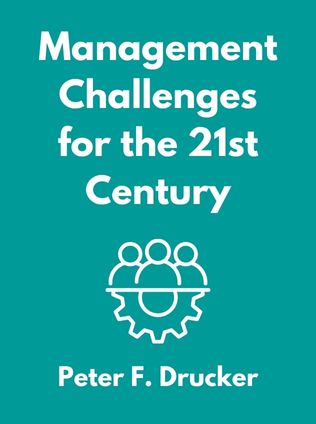
Management Challenges for the 21st Century
By Peter F. Drucker
Published 04/1999
About the Author
Peter F. Drucker, often referred to as the father of modern management, has profoundly influenced the business world with his insights and theories. Born in Vienna in 1909, Drucker’s career spanned over six decades, during which he authored more than 30 books on management, economics, and society. His seminal works include The Practice of Management, Managing for Results, and The Effective Executive.
Drucker’s unique approach combined keen observations of business practices with deep philosophical inquiries, positioning him as both a management consultant and a social commentator. He held academic positions at several institutions, including New York University and Claremont Graduate University, where he was the Clarke Professor of Social Science and Management. Drucker’s influence extended beyond academia and into the practical realms of business, where his ideas helped shape modern corporate management and strategy.
Main Idea
Management Challenges for the 21st Century by Peter F. Drucker delves into the profound transformations expected to reshape the business landscape in the new millennium. Drucker challenges traditional management paradigms and offers new frameworks for understanding and navigating these changes. The book emphasizes that the successful leaders of the future will be those who can adapt to and drive change, rather than merely react to it. Central to this is the shift from managing to leading, recognizing the importance of knowledge workers, and understanding the global context in which businesses operate.
Table of Contents
- Management’s New Paradigms
- Strategy: The New Certainties
- The Challenge of Change Leadership
- Information Challenges: From the 'T' to the 'I' in 'IT'
- Knowledge Worker Productivity: The Future of Manual Labor
- Managing Oneself
Management’s New Paradigms
We live in a period of profound transition, where the assumptions of the past no longer hold true. Drucker argues that the old paradigms of management, which focused on business management, hierarchical organizational structures, and managing people, are outdated. Instead, he introduces new paradigms that emphasize the need to lead rather than manage, the importance of flexible and tailored organizational structures, and the necessity to look beyond traditional business boundaries.
- Management is not just business management. It applies to all forms of organizations including government, healthcare, and education.
- There is no one-size-fits-all organizational structure. Each organization must develop and test structures that fit their specific tasks and goals.
- Managers must become leaders. This involves inspiring and guiding employees rather than merely managing them.
“In the new century, your management skills can be applied to activities not traditionally considered business, such as government, healthcare, the professions and education.” - Peter F. Drucker
In redefining management, Drucker emphasizes that the skills honed in business management are broadly applicable. Whether in government agencies, healthcare systems, educational institutions, or non-profit organizations, the principles of effective management can drive success. This shift requires a departure from the rigid, hierarchical structures of the past and a move towards more adaptive and responsive organizational forms. The essence of leadership, according to Drucker, lies in guiding and inspiring people rather than merely supervising them. This approach is crucial in a world where employees seek meaningful and rewarding work experiences.
Sign up for FREE and get access to 1,400+ books summaries.
You May Also Like
Rich Dad Poor Dad
What the Rich Teach Their Kids About Money - That the Poor and Middle Class Do Not!
By Robert T. KiyosakiFreakonomics
A Rogue Economist Explores the Hidden Side of Everything
By Steven D. Levitt and Stephen J. DubnerThe Lean Startup
How Today's Entrepreneurs Use Continuous Innovation to Create Radically Successful Businesses
By Eric RiesWho Moved My Cheese?
An Amazing Way to Deal with Change in Your Work and in Your Life
By Spencer Johnson, M.D.Factfulness
Ten Reasons We're Wrong About the World – and Why Things Are Better Than You Think
By Hans RoslingMake Your Bed
Little Things That Can Change Your Life...And Maybe the World
By William H. McRaven



















